
Congratulations on your positive pregnancy test! One of the first things many women want to determine after finding out they’re pregnant is their due date. You might wonder about the month your baby will be born, their zodiac sign, or how big the fetus is at this stage. The anticipation of holding your little one’s tiny hands for the first time can make you curious about the length of your pregnancy.
Is it a 38-week pregnancy or 40 weeks? Understanding the duration of pregnancy can be confusing, with questions about days, weeks, and months often arising. Pregnancy calculators or charts that calculate pregnancy weeks can be incredibly useful in providing clarity. In this guide, we’ll help you understand how pregnancy calculators work and how you can use them to determine your pregnancy weeks and months.
Video – Calculating your Pregnancy Weeks and Months
When Does Pregnancy Start?
According to the experts, pregnancy starts from the first day of LMP (last menstrual period) (1). However, the calculation through the last menstrual day may be technically incorrect. Even though you remember the date of intercourse, calculating through the last menstrual is not 100% sure.
Sometimes, sperm do not fertilize the egg immediately after intercourse. It may take up to 3 days before it reaches the egg. After the fertilization of the egg, which usually happens on the 14th day, it takes around 5-6 days for implantation into the uterus (2). Hence, there is no accurate evidence to say when a woman conceives after intercourse.
How Long is Pregnancy in Weeks?
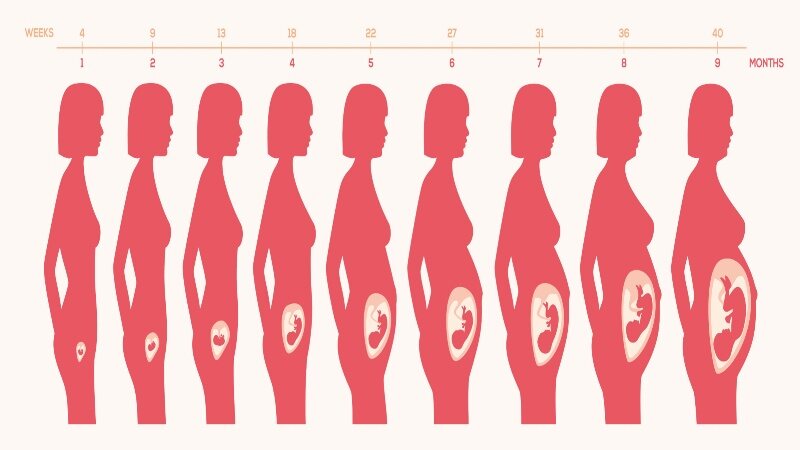 Okay, so now you know about the starting day of pregnancy; another question that creates curiosity is, “How long does it last in weeks?” In most cases, pregnancy lasts from 38 weeks to 42 weeks. To make it more convenient, your pregnancy due date from the last LMP will be 280 days or 40 weeks. The full-term pregnancy is further segmented into three trimesters (3).
Okay, so now you know about the starting day of pregnancy; another question that creates curiosity is, “How long does it last in weeks?” In most cases, pregnancy lasts from 38 weeks to 42 weeks. To make it more convenient, your pregnancy due date from the last LMP will be 280 days or 40 weeks. The full-term pregnancy is further segmented into three trimesters (3).
First Trimester: The first trimester lasts for 3 months to 3.5 months or 14 weeks
Second Trimester: The second trimester lasts for 3 months to 3.5 months or 14 weeks
Third Trimester: The third trimester lasts for 3 months or 12 weeks.
Pregnancy Weeks to Months Conversion Chart
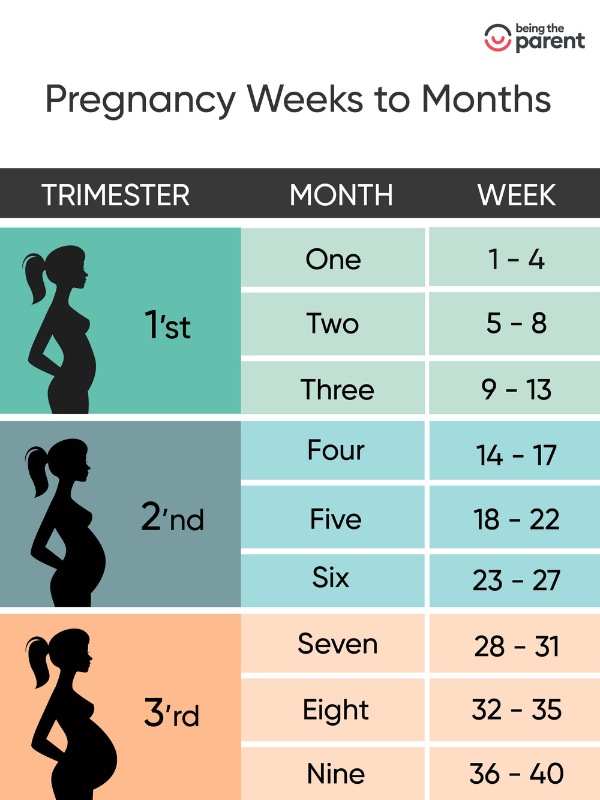
Understanding pregnancy weeks and months can be confusing for a woman. The different criteria, such as months, weeks, and trimesters, can create a lot of confusion. To simplify it for better understanding, here is a quick pregnancy week to months conversion chart (4).
Common Mistakes in Calculating Pregnancy Weeks and Months
Scanning early pregnancy to predict due date may not match with menstrual or conception history. In many cases, calculating pregnancy weeks and months can be challenging and result in the common mistakes listed below.
1. Miscalculating Start Date
Pregnancy is calculated from the first day of LMP (last menstrual period) instead of from the date of conception. Some women start their calculation about two weeks before fertilization and ovulation which is erroneous.
2. Months Calculation Error
Many women assume that each month has four weeks. So they calculate the pregnancy weeks and months based on four weeks. This may lead to miscalculation because pregnancy lasts for 40 weeks, which may convert into 9 or 10 months on average.
3. Ignoring Menstrual Cycle Variability
The menstrual cycle of all women is not the same or has 28 days of menstrual cycle. Some have longer or shorter cycles, depending on the ovulation (5). This may affect the pregnancy months or weeks calculation.
4. Confusion Between Gestational Age and Fetal Age
Fetal age is about two weeks less than gestational age as measured by the LMP. Mismatching these dates can result in two-week confusion (6).
Differences Between Gestational Age and Fetal Age?
Some women often use gestational age and fetal age terms interchangeably. But both the terms are different from each other (7). Let us understand their differences with the help of this table-
| Gestational Age | Fetal Age |
|---|---|
| The age of the pregnancy is calculated from the woman’s last menstrual period (LMP) | The actual age of the growing baby, starting from the time of conception |
| Referred to as the menstrual age | Referred to as the conceptual age |
| Includes an additional 2 weeks time when the woman is not pregnant | Calculated after conception |
| Developmental Stage – First 4 weeks | Developmental Stage – First 2 weeks |
| Embryonic Stage is calculated from 5th to 10th week | Embryonic Stage is calculated from 3rd to 8th week |
| The fetal stage persists through 11th to 40th weeks | The fetal stage persists through 9th to 38th weeks |
| The length of the pregnancy is 40 weeks | The length of the pregnancy is 38 weeks |
| More Accurate | Less Accurate |
What Are the Trimesters?
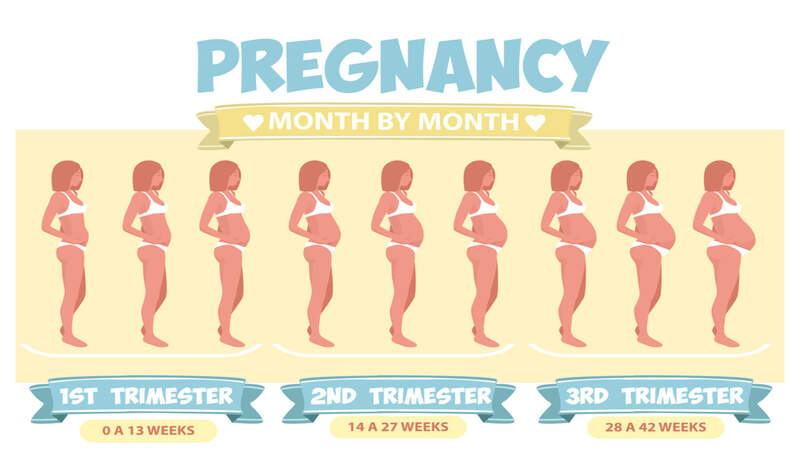
Your pregnancy is divided into three trimesters, each of them lasting about 3 months (8). Because most pregnancies last for about 9 months, each trimester is about 3 months long and is standard across the world. The breakup of the trimesters is as follows:
- First Trimester: Beginning of your pregnancy till about you are 13 weeks and 6 days
- Second Trimester: Begins when you are 14 weeks and lasts till 27 weeks plus 6 days
- Third Trimester: Starts when you are 28 weeks till the time you have your baby
Importance of Accurate Pregnancy Tracking
Accurate knowledge of the pregnancy age is crucial for numerous reasons. For instance, accurate gestational age helps to determine the accurate intervals required for prenatal care visits, allowing pregnant women to discuss their concerns and symptoms more accurately with healthcare experts. Additionally, accurate tracking can help in managing challenges associated with pregnancy. Also, accurate pregnancy journal tracking can help to learn about fetal movement, organ development, heart rate patterns, and progress more appropriately (9).
How to Calculate the Estimated Due Date During Pregnancy?
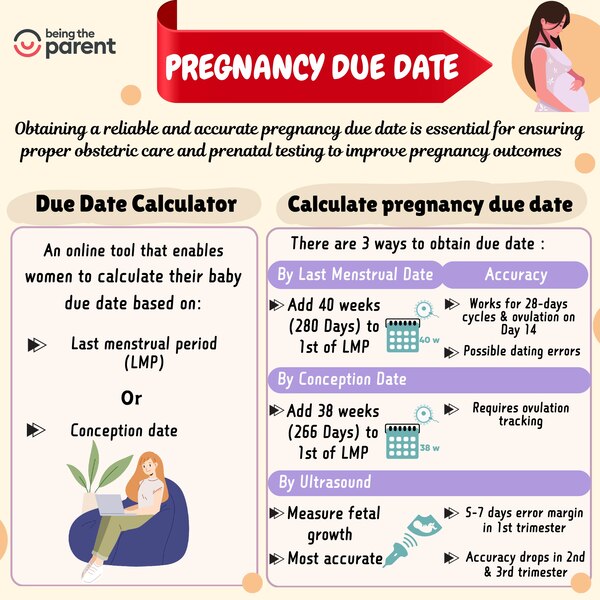 The due date of pregnancy can be predicted by the first of the LMP and period wheel. Doctors can calculate the due date by determining the first day of the last menstrual period or by adding seven days and then deducting three months. However, this rule may be applicable if a woman has a regular menstrual cycle of 28 days. However, if the menstrual cycle is long or short, the due date of pregnancy may vary. Ultrasound during the first trimester is generally used to determine the due date based on the last menstrual period (10).
The due date of pregnancy can be predicted by the first of the LMP and period wheel. Doctors can calculate the due date by determining the first day of the last menstrual period or by adding seven days and then deducting three months. However, this rule may be applicable if a woman has a regular menstrual cycle of 28 days. However, if the menstrual cycle is long or short, the due date of pregnancy may vary. Ultrasound during the first trimester is generally used to determine the due date based on the last menstrual period (10).
When is Delivery Considered Premature or Late?
When a baby is delivered before 37 weeks of the gestational period, it is considered premature delivery or preterm delivery. If a baby is delivered after 42 weeks of pregnancy, it is considered a post-term pregnancy or late pregnancy. With preterm delivery, there are several risks, such as low nutrition, being underweight, and slow development (11).
[Read : Premature Labor- Causes, Risk Factors, Signs, Prevention And Treatment]
What if My Periods Are Irregular?

The due date calculation estimate works best when you have regular cycles, and you get your periods every 28 days. Because in case your periods are irregular, you will not know your LMP and ovulation date cannot be ascertained, arriving on your due date can be difficult.
In such a scenario, your first ultrasound scan or dating scan will give you a viable due date. The sonographer will measure your baby from crown to length, essentially meaning from your baby’s head to bottom. This measurement is a good accurate idea of how far along your pregnancy is (12).
[Read : When Will I Have My First Scan During Pregnancy?]
How Long Will My Pregnancy Last?
Most pregnancies last 38 weeks to 42 weeks. But for the sake of convenience, your due date is calculated 280 days from your LMP. Two hundred eighty days or 40 weeks (13). Your baby stays inside your womb only for 38 weeks. And you are almost always two weeks ahead in your pregnancy.
Essentially, your pregnancy for 40 weeks lasts:
- 9 calendar months (30 or 31 days each)
- 10 lunar months (28 days each)
How Are Pregnancy Weeks And Months Calculated?
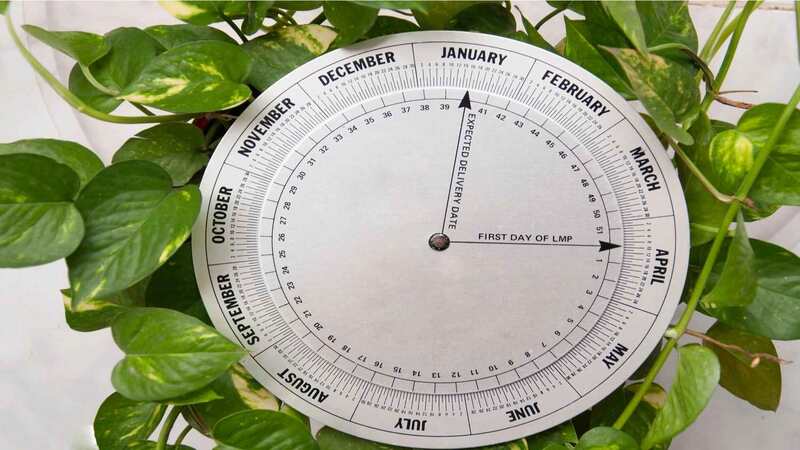
In the first week of your pregnancy (based on LMP), you are zero weeks of pregnancy. In the second week, you are one week of pregnancy. That means, in the nth week of your pregnancy, you (n-1) weeks pregnant. While this might sound a bit confusing, it works exactly the way our age works. So, when you are in the 10th week of pregnancy, you say you are nine weeks of pregnancy. The same rule applies for “months” as well. In the first month of your pregnancy, you are zero month pregnancy (as silly as that sounds). In the second month, you say you are one month pregnant, and so on (14).
How Doctors Calculate Pregnancy Weeks and Months?
Doctors calculate pregnancy weeks and months by using a set of three methods to count pregnancy weeks – based on LMP, using ultrasound, and thorough physical examination.
1. Physical Examination Method
One can know one’s pregnancy week by the size of the uterus. In the 12 weeks, your medical practitioner can feel the uterus above the pelvis (15).
[Read : Fundal Height in Pregnancy – How to Measure Pregnant Belly Size?]
2. Using Ultrasound Method
Ultrasound works when you are not aware of the LMP or have irregular periods. It is based on a measurement of the gestational sac and the fetus. The sonographer calculates the baby from head to toe. It gives the crown-rump length or CRL. The first ultrasound during pregnancy helps the doctor to estimate the pregnancy weeks based on the growth of the baby.
So yes, you calculated 40 weeks from the LMP, and ta-da you have the due date. However, please remember that this is only an estimate. Only very few women, to the tune of a meager 5%, deliver exactly on the due date. The actual date for a full term can be any time between the 38th week to 42nd week, so a week on either side of the due date. Why? Because your baby has not seen your calculation! You plan everything keeping the due date in mind, but always remember it is an estimate!
Here is wishing you a happy and safe pregnancy! Take care!
[Read Also: Stages Of Pregnancy By Week]
FAQ’s
1. When Are You Officially Pregnant?
You will be officially pregnant on or near about 21 days after fertilization. After the fertilization of the egg, which usually happens on the 14th day, it takes around 5-6 days for implantation into the uterus.
2. Does 5 Weeks Pregnant Mean 3 Weeks?
Yes, the 5 weeks of pregnancy means 3 weeks. The growing fetus is actually only 3 weeks old. Pregnancy weeks are usually calculated from the last period, so in the first week, the body prepares for implantation.
3. How Do I Know I Am Pregnant Without A Test?
Missing period, soreness in the breast, nausea, and frequent urination are some of the signs that indicate you are pregnant.
References
- NHS, You and your pregnancy at 1 to 3 weeks – https://www.nhs.uk/pregnancy
- American Pregnancy Association, 1-2 Weeks Pregnant –
https://americanpregnancy.org/healthy-pregnancy/week-by-week/pregnancy-week-1-2/ - ACOG, How long does pregnancy last? – https://www.acog.org/womens-health/
- NHS, Your baby’s weight and height – https://www.nhs.uk/conditions/baby/babys-development
- Better Health Channel, Menstrual cycle – https://www.betterhealth.vic.gov.au/health/
- Kullinger M, Granfors M, Kieler H, Skalkidou A. Discrepancy between pregnancy dating methods affects obstetric and neonatal outcomes: a population-based register cohort study. Sci Rep. 2018 Ma –
https://www.ncbi.nlm.nih.gov/pmc/articles/PMC5932022/ - American Pregnancy Association, Fetal Development – How to Calculate Gestational Age –
https://americanpregnancy.org/healthy-pregnancy/while-pregnant/fetal-development/ - Jackson Health sysytem, Understanding Each Trimester of Your Pregnancy –
https://maternity.jacksonhealth.org/pregnancy-milestones/ - Morgan JA, Cooper DB. Pregnancy Dating. [Updated 2022 Sep 12]. In: StatPearls [Internet]. Treasure Island (FL): StatPearls Publishing; 2024 Jan – https://www.ncbi.nlm.nih.gov/books/NBK442018/
- Stanford Medicine, Ultrasound in Pregnancy – https://www.stanfordchildrens.org
- World Health Organisation, Preterm birth – https://www.who.int/news-room/
- Edwards KI, Itzhak P. Estimated Date of Delivery. [Updated 2022 Oct 24]. In: StatPearls [Internet]. Treasure Island (FL): StatPearls Publishing; 2024 – https://www.ncbi.nlm.nih.gov/books/NBK536986/
- WebMD, Estimating Your Due Date – https://www.webmd.com/women/estimate-due-date
- Johns Hopkins Medicine, Calculating a Due Date – https://www.hopkinsmedicine.org/health/
- Naidu K, Fredlund KL. Gestational Age Assessment. [Updated 2023 Jul 24]. In: StatPearls [Internet]. Treasure Island (FL): StatPearls Publishing; 2024 – https://www.ncbi.nlm.nih.gov/books/NBK526000/
